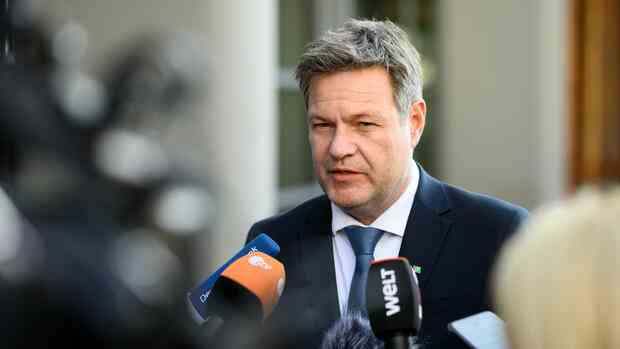As early as 2030, the use, capture and storage of carbon dioxide (CCS) “on a megaton scale” would have to be used primarily for industry, according to the ministry’s “Evaluation Report on the Carbon Dioxide Storage Act”, which is available to the Handelsblatt. First, the digital media house Table Media reported about it.
According to the evaluation report, by 2045 at the latest, residual emissions of 34 to 73 million tons of CO2 will have to be exported and stored every year.
The government report is based on five scientific studies. They see CCS as necessary in the cement, glass, lime, waste and chemical sectors, for example, in order to achieve the legally stipulated climate neutrality by 2045.
Specifically, legal uncertainties in the approval of CO2 separation systems are to be eliminated and the Energy Industry Act is to be adapted for the planning of CO2 pipelines, according to the report. In addition, the government should already have a comprehensive carbon management strategy in place by mid-2023.
CCS technology has not yet been used in Germany. CCS stands for “Carbon Capture and Storage”. The reason is the Carbon Dioxide Storage Act (KSpG), which came into force in 2012. A long dispute preceded the passage of the law.
CCS has not played a role in Germany so far
The law limits the use of the technology to small projects with very low CO2 volumes and also includes an opt-out clause that allows each federal state to exclude the use of CCS. Mecklenburg-Western Pomerania, Lower Saxony and Schleswig-Holstein have made use of the state clause. In practice, the technology in Germany therefore plays no role.
However, according to scientists, CCS is indispensable. “Climate neutrality cannot be achieved without CCS. The traffic light coalition is therefore well advised to create the legal prerequisites to enable CCS technology in Germany as well,” said Oliver Geden from the Stiftung Wissenschaft und Politik (SWP) of the Handelsblatt. He has been dealing with the subject for many years.
The current legal regulation is “completely inadequate”. Rather, it serves the purpose of preventing the technology.
Geden is convinced that some hurdles can be quickly removed. “Nowadays, you can’t bring CO2 across national borders to store it somewhere else, such as in Norway, under the seabed,” says Geden. To change this, one would only have to “ratify the relevant amendment to the London Protocol”.
The London Protocol is a global agreement for the protection of the marine environment. Under Article 6, Parties are not permitted to export waste or other materials for landfill or incineration at sea.
>> Read also: Norway’s Prime Minister Jonas Gahr Støre talks about Norway’s CCS ambitions in an interview
Norway plays a central role in the CCS debate. The country is one of the pioneers of technology. It has been used there since 1996. The country is currently in the process of setting up a CCS infrastructure that should be open to companies from all over Europe.
Norway is an international pioneer when it comes to CO2 storage – but international agreements have so far prevented companies from accessing it.
(Photo: Klaus Stratmann, Handelsblatt)
German companies are also signaling an interest in CO2 storage in Norway. However, this is currently not possible without amending the London Protocol.
Coalition parties are already signaling approval
Habeck receives support for his initiative from the coalition partner FDP. “We can only achieve a secure and climate-friendly energy supply with negative emissions and storage of CO2,” said Michael Kruse, energy policy spokesman for the FDP parliamentary group, to the Handelsblatt. He is pleased that the topic is now on the agenda. “We support Robert Habeck in a speedy implementation,” said Kruse.
However, the support from the FDP has a catch: Kruse also wants to use CO2 storage in power plants that are operated with coal or gas: Thanks to CCS, “the conventional power plants that are still necessary to stabilize power grids in the energy transition can be used without having to these damage the climate,” said Kruse.
The FDP would also like to store fossil emissions underground – but the Greens are not going along with that.
(Photo: Getty Images; Per-Anders Pettersson)
This is likely to be met with rejection from the Greens. They want to limit the use of CCS technology to unavoidable industrial emissions – and not to allow fossil power plants to run longer.
The Federal Environment Agency puts the amount of unavoidable emissions from industry and waste and wastewater management in Germany at 43 million tons per year. The value is therefore within the range that the Ministry also assumes in its report. A total of 739 million tons of greenhouse gases were released in Germany in 2020.
Negative emissions are also included in the coalition agreement
Habeck follows the line of the traffic light coalition with the report. The coalition partners have avoided using the term “CCS” in the coalition agreement. Nevertheless, it says: “We are committed to the need for technical negative emissions and will develop a long-term strategy for dealing with the approximately five percent unavoidable residual emissions.”
CCS is controversial among the Greens. However, Greens leader Ricarda Lang visited Norway in August, where she spent two days exclusively on the subject of CCS. This was taken as a signal of openness.
More: Habeck is helping the industry with billions in the transformation
